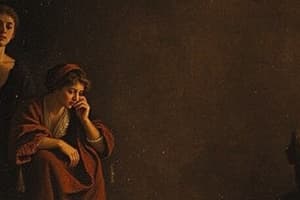Podcast
Questions and Answers
In The Crucible, Arthur Miller explores how a culture of surveillance and fear can lead to widespread ______.
In The Crucible, Arthur Miller explores how a culture of surveillance and fear can lead to widespread ______.
hysteria
Miller’s play serves as an 'Instrument of instruction,' allegorically paralleling Salem to the ______.
Miller’s play serves as an 'Instrument of instruction,' allegorically paralleling Salem to the ______.
Red Scare
The narration establishes a panoptic culture of ______.
The narration establishes a panoptic culture of ______.
surveillance
The juxtaposition highlights the power of fear to motivate individuals towards ______ for the sake of security.
The juxtaposition highlights the power of fear to motivate individuals towards ______ for the sake of security.
Miller’s didascalie suggests that excessive repression will always produce ______.
Miller’s didascalie suggests that excessive repression will always produce ______.
Proctor initially fears collective moral ______.
Proctor initially fears collective moral ______.
This creates a paradoxical situation, where individuals are cowed into utter moral ______ at any cost.
This creates a paradoxical situation, where individuals are cowed into utter moral ______ at any cost.
Miller’s quote 'hard ______' highlights the lengths individuals will go to maintain appearances.
Miller’s quote 'hard ______' highlights the lengths individuals will go to maintain appearances.
Abigail’s threatening tone, ‘Let either of you breathe a ______…’ reveals the lengths she is willing to go to protect her lies.
Abigail’s threatening tone, ‘Let either of you breathe a ______…’ reveals the lengths she is willing to go to protect her lies.
Miller utilises this to critique how unchecked personal ambition, coupled with societal ______, can destabilise communities.
Miller utilises this to critique how unchecked personal ambition, coupled with societal ______, can destabilise communities.
Thus, declining trust decays the social ______, aggravating existing tensions.
Thus, declining trust decays the social ______, aggravating existing tensions.
Miller reveals the power of self-interested individuals to manipulate the collective for personal ______.
Miller reveals the power of self-interested individuals to manipulate the collective for personal ______.
In response to such widespread disorder, anomalous individuals can promote the restoration of the ______, as their idiosyncratic morality allows them to resist collective manipulation.
In response to such widespread disorder, anomalous individuals can promote the restoration of the ______, as their idiosyncratic morality allows them to resist collective manipulation.
Miller establishes Proctor’s anomalous character through authorial ______.
Miller establishes Proctor’s anomalous character through authorial ______.
His refusal to confess places pressure on the court to maintain ______.
His refusal to confess places pressure on the court to maintain ______.
Danforth’s high ______ suggests the eventual vulnerability of previously unquestionable authority.
Danforth’s high ______ suggests the eventual vulnerability of previously unquestionable authority.
Miller invites responders to critically reflect on the complexities of human behaviour and the severe consequences of societal pressures driven by ______ and surveillance.
Miller invites responders to critically reflect on the complexities of human behaviour and the severe consequences of societal pressures driven by ______ and surveillance.
Subsequently, this widespread hysteria is exacerbated by selfish individuals prioritising themselves over the collective ______.
Subsequently, this widespread hysteria is exacerbated by selfish individuals prioritising themselves over the collective ______.
Miller examines how individuals' moral compasses are corrupted for their desires due to the collapse of the social ______.
Miller examines how individuals' moral compasses are corrupted for their desires due to the collapse of the social ______.
Miller uses diction associated with ______ to highlight Reverend Parris’s materialistic and self-centred desires.
Miller uses diction associated with ______ to highlight Reverend Parris’s materialistic and self-centred desires.
Miller showcases how the selfish nature of those prioritising their desires over social morals leads to the ______ of the collective's moral compass.
Miller showcases how the selfish nature of those prioritising their desires over social morals leads to the ______ of the collective's moral compass.
Through this, Miller explores the decline of the social contract as a result of morally corrupt ______ actions.
Through this, Miller explores the decline of the social contract as a result of morally corrupt ______ actions.
This is showcased in Abigail’s quantitative listing, stating that ‘Sarah Good’, ‘Goody Osborn’, and ‘______ Bishop’ all ‘with the devil’ highlight how the narration of Abigail’s endless capacity for dissembling.
This is showcased in Abigail’s quantitative listing, stating that ‘Sarah Good’, ‘Goody Osborn’, and ‘______ Bishop’ all ‘with the devil’ highlight how the narration of Abigail’s endless capacity for dissembling.
This results in Salem returning to the Hobbesian State of ______, where each individual prioritises their interest over the moral health of the collective.
This results in Salem returning to the Hobbesian State of ______, where each individual prioritises their interest over the moral health of the collective.
Flashcards
Societal pressures in Salem
Societal pressures in Salem
Fear and surveillance create widespread hysteria, impacting individual morality in Salem.
Selfish individuals in Salem
Selfish individuals in Salem
Individuals prioritize personal gain over community well-being, weakening social contracts.
Moral compass corruption
Moral compass corruption
Individuals' moral compasses are twisted by desires due to a broken social contract.
Power dynamics shift
Power dynamics shift
Signup and view all the flashcards
Abigail's dissembling
Abigail's dissembling
Signup and view all the flashcards
Materialistic desires
Materialistic desires
Signup and view all the flashcards
Social contract breakdown
Social contract breakdown
Signup and view all the flashcards
Hobbesian State of Nature
Hobbesian State of Nature
Signup and view all the flashcards
Culture of Surveillance
Culture of Surveillance
Signup and view all the flashcards
Hysteria in The Crucible
Hysteria in The Crucible
Signup and view all the flashcards
Red Scare Allegory
Red Scare Allegory
Signup and view all the flashcards
Manichean Moral Ideals
Manichean Moral Ideals
Signup and view all the flashcards
Conformity for Security
Conformity for Security
Signup and view all the flashcards
Excessive Repression
Excessive Repression
Signup and view all the flashcards
Paradoxical Situation
Paradoxical Situation
Signup and view all the flashcards
Individual's Fear of Exclusion
Individual's Fear of Exclusion
Signup and view all the flashcards
Abigail's Threat
Abigail's Threat
Signup and view all the flashcards
Power of Manipulation
Power of Manipulation
Signup and view all the flashcards
Restoring Collective
Restoring Collective
Signup and view all the flashcards
Proctor's Anomalous Character
Proctor's Anomalous Character
Signup and view all the flashcards
Proctor's Refusal
Proctor's Refusal
Signup and view all the flashcards
Authority Vulnerability
Authority Vulnerability
Signup and view all the flashcards
Hysterical Moral Binaries
Hysterical Moral Binaries
Signup and view all the flashcards
Declining Trust
Declining Trust
Signup and view all the flashcards
Study Notes
Dramatic Convention, Context Intro
- Miller's The Crucible explores how surveillance and fear lead to widespread hysteria.
- Individuals fear exclusion, accepting irrational ideas.
- The play is an allegorical parallel of Salem and the Red Scare, illustrating vulnerability to corruption.
- "Two-man patrol" exemplifies a panoptic surveillance culture, motivating suspicion of others.
- Fear motivates conformity, as seen in "either obedience or the church will burn like hell."
- Excessive repression breeds hypocrisy, and the individual, like Proctor, fears judgment.
Techniques and Analysis
- Moral Corruption: Individuals prioritize personal gain over collective good, corrupting moral compasses.
- Character's Wealth: "Gold candlesticks" highlights Reverend Parris's materialism, affecting power dynamics.
- Social Dynamics Shift: Lower-class characters rise in power during hysteria (e.g., Mary Warren, Abigail).
- Abigail's Power: Abigail's manipulative language and actions create fear and control, impacting moral judgements.
- Loss of Trust: The eroding social contract due to self-interest.
- Miller uses diction related to wealth: illustrating corruption and individual desires.
Proctor's Resistance
- Proctor's refusal to confess challenges the court's legitimacy, pressing on its need for legitimacy.
- Proctor's honesty in rejecting the court exemplifies potential for moral reformation and challenging authority.
- Proctor's "shred of goodness" demonstrates individual integrity challenging societal pressures.
- Miller's depiction of Proctor's resistance reflects the struggle between personal integrity and societal oppression.
- Miller subverts conventional tragedy, emphasizing the possibility of individual resistance and moral change.
Studying That Suits You
Use AI to generate personalized quizzes and flashcards to suit your learning preferences.
Related Documents
Description
This quiz delves into Arthur Miller's The Crucible, exploring themes of surveillance, fear, and moral corruption within the context of hysteria. It examines the influence of power dynamics, character motivations, and social shifts that arise during this tension-filled narrative. Test your understanding of these dramatic conventions and their ramifications.




